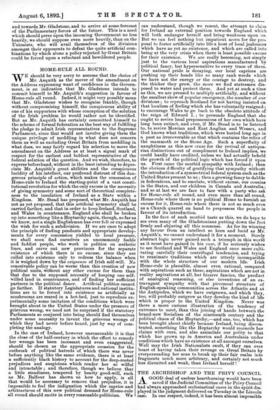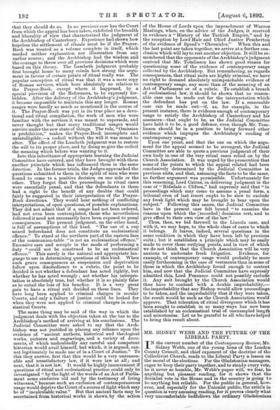THE ARCEBISHOP AND THE PRIVY COUNCIL A GOOD deal of useless
heartburning would have been saved if thedndicial Committee of the Privy Council had always approached ecclesiastical cases in the spirit dis- played in the judgment delivered on Tuesday in the Lincoln case. In one respect, indeed, it has been almost impossible that they should do so. In no previous case has the Court from which the appeal has been taken, exhibited the breadth and liberality of view that characterised the judgment of the Archbishop of Canterbury. Experience had shown how hopeless the settlement of rituals must be if the Prayer- Book was treated as a volume complete in itself, which needed neither explanation nor illustration from any earlier source; and the Archbishop had the wisdom and the courage to throw over all previous decisions which were based on this theory. The Lambeth judgment probably first brought home to many minds how strong the argu- ment in favour of -certain points of ritual really was. The popular conception of ritual was that it was a mere copy of Roman services, which bore absolutely no relation to the Prayer-Book, except where it happened, by a special prevision of the Reformers, to be expressly for- bidden. After the delivery of the Archbishop's judgment, it became impossible to maintain this any longer. Roman usages were hardly so much as mentioned in the course of it. The Prayer-Book was put in its true place as a devo- tional and ritual compilation, the work of men who were familiar with the services it was meant to supersede, and never thought but that many traditional usages would survive under the new state of things. The rule, "Omission is prohibition," makes the Prayer-Book incomplete and unintelligible,—a codicil without the will it was meant to alter. The effect of the Lambeth judgment was to restore the will to its proper place, and by doing so give the codicil the meaning which before was wanting to it. Into this inheritance of appropriate learning the Judicial Committee have entered, and they have brought with them another principle which has influenced them in the same direction. In the former trials, the Judges approached the questions submitted to them in the spirit of men who were baund to come to a positive decision on one side or the other. They forgot that the proceedings in ritual cases were essentially penal, and that the defendants in them had a right to the benefit of any doubts that could fairly be suggested iu their interpretation of the Prayer- Book directions. They would hear nothing of conflicting interpretations, of open questions, of possible explanations. They did not admit that if a usage had not been ordered, had. not even been contemplated, those who nevertheless followed it need not necessarily have been exposed to penal consequences. The present judgment, on the other hand, is full of assumptions of this kind. "The use of a cup mixed beforehand does not constitute an ecclesiastical offence." To stand at the northern part of the eastern face of the communion-table "is not an ecclesiastical offence." Excessive care and scruple in the mode of performing a duty "could not be construed to be an ecclesiastical offence." This surely is the natural and. appropriate lan- guage to use in determining questions of this kind. When snch grave consequences as suspension and deprivation follow upon disobedience to a. rubric, the point to be decided is not whether a defendant has acted rightly, but whether he has acted wrongly ; not whether his interpre- tation is absolutely true, but whether it is so plainly false as to entail the loss of his benefice. It is a very great gain to have a ritual suit decided on these lines. They have long been applied to criminal charges in secular Courts, and only a failure of justice could be looked for when they were not applied to criminal charges in cede- siaatical Courts.
The same thing may be said of the way in which the judgment deals with the objection taken at the bar to the Archbishop's method of arriving at his conclusions. The Judicial Committee were asked to say that the Arch- bishop was not justified in placing any reliance upon the evidence of "ancient authors, historical and theological works, pictures and engravings, and a variety of docu- ments, of which undoubtedly any careful and competent historian would avail himself, but which, it is argued, can- not legitimately be made use of in a Court of Justice." To this they answer, first that this would be a very unreason- able and unsatisfactory law, if it were law at all ; and next, that it is not law. It would be highly inconvenient if questions of ritual and ecclesiastical practice could only be investigated "by the light of the words of an Act of Parlia- ment some centuries old and by the testimony of living witnesses," because such an exclusion of contemporaneous usage would deprive the Court of a source of light which may be of "incalculable value." But that ancient facts may be ascertained from historical works is shown by the action of the House of Lords upon the impeachment of Warren Hastings, when, on the advice of the Judges, it received in evidence a "History of the Turkish Empire," and by the reception by Lord Hale and Chief Justice Pemberton of the evidence of Speed's "Chronicles." When this and the last point are taken together, we arrive at a further con- clusion which will layto rest another objection. It will be re- membered that the opponents of the Archbishop's judgment contend that Mr. Tomlinson has shown good reason for questioning some of the evidence of contemporary usage collected by the Archbishop. But remembering, as regards consequences, that ritual suits are highly criminal, we have no right to demand absolutely unimpeachable evidence of contemporary usage, any more than of the meaning of an Act of Parliament or of a rubric. To establish a breach of ecclesiastical law, it should be shown that no reason- able case can be made out for the interpretation which the defendant has put on the law. If a reasonable case can be made out—if, as, for example, in the present instance, there is evidence enough of contemporary usage to satisfy the Archbishop of Canterbury and his assessors—that ought to be, as the Judicial Committee have held it to be, a good defence, even though Mr. Tom- linson should be in a position to bring forward other evidence which impugns the Archbishop's reading of contemporary usage.
Upon one point, and that the one on which the argu- ment for the appeal seemed to be strongest, the Judicial Committee are able to quote a previous judgment of their own body in one of the very ritual cases relied on by the Church Association. It was urged by the prosecution that some of the points to which the appeal related had been conclusively determined by the Judicial Committee in previous suits, and that, assuming the facts to be the same, no further argument was permissible. Unfortunately for this reasoning, Lord. Cairns, in delivering judgment in the case of " Ridsdale v. Clifton," had expressly said that "in proceedings which may come to assume a penal form, a tribunal even of last resort ought to be slow to exclude any fresh light which may be brought to bear upon the subject." Following this canon, the Judicial Committee have in the present case felt bound "to examine the reasons upon which the [recorded] decisions rest, and to give effect to their own view of the law."
Thus, then, we bid farewell to the Lincoln case, and with it, we may hope, to the whole class of cases to which it belongs. It leaves, indeed, several questions in the same condition in which they have been left by previous suits ; but it establishes a principle which may be easily made to cover these outlying points, and in view of which we do not think that the Church Association will be very anxious to undertake fresh litigation. Evidence, for example, of contemporary usage would. probably be more easily forthcoming in the case of vestments than in some of those in which the Archbishop found enough to content him, and now that the Judicial Committee have expressly admitted. this, Lord Penzance could not possibly exclude it. Any suit brought by the Church Association would thus have to contend with a double improbability,— the improbability that any Bishop would allow proceedings to be taken, and the improbability that if they were taken, the result would be such as the Church Association would approve. That toleration of ritual divergence which it has been sought to establish in so many ways has now been established by an ecclesiastical trial of unexampled length and. minuteness. Let us be grateful to all who have helped to bring this result about.



































 Previous page
Previous page